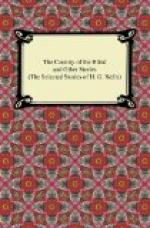It was the inhuman immensity of this land that astonished and oppressed him. He knew the skies were empty of men, the stars were specks in an incredible vastness of space; he knew the ocean was enormous and untamable, but in England he had come to think of the land as man’s. In England it is indeed man’s, the wild things live by sufferance, grow on lease, everywhere the roads, the fences, and absolute security runs. In an atlas, too, the land is man’s, and all coloured to show his claim to it— in vivid contrast to the universal independent blueness of the sea. He had taken it for granted that a day would come when everywhere about the earth, plough and culture, light tramways and good roads, an ordered security, would prevail. But now, he doubted.
This forest was interminable, it had an air of being invincible, and Man seemed at best an infrequent precarious intruder. One travelled for miles, amidst the still, silent struggle of giant trees, of strangulating creepers, of assertive flowers, everywhere the alligator, the turtle, and endless varieties of birds and insects seemed at home, dwelt irreplaceably—but man, man at most held a footing upon resentful clearings, fought weeds, fought beasts and insects for the barest foothold, fell a prey to snake and beast, insect and fever, and was presently carried away. In many places down the river he had been manifestly driven back, this deserted creek or that preserved the name of a casa, and here and there ruinous white walls and a shattered tower enforced the lesson. The puma, the jaguar, were more the masters here...
Who were the real masters?
In a few miles of this forest there must be more ants than there are men in the whole world! This seemed to Holroyd a perfectly new idea. In a few thousand years men had emerged from barbarism to a stage of civilisation that made them feel lords of the future and masters of the earth! But what was to prevent the ants evolving also? Such ants as one knew lived in little communities of a few thousand individuals, made no concerted efforts against the greater world. But they had a language, they had an intelligence! Why should things stop at that any more than men had stopped at the barbaric stage? Suppose presently the ants began to store knowledge, just as men had done by means of books and records, use weapons, form great empires, sustain a planned and organised war?
Things came back to him that Gerilleau had gathered about these ants they were approaching. They used a poison like the poison of snakes. They obeyed greater leaders even as the leaf-cutting ants do. They were carnivorous, and where they came they stayed...
The forest was very still. The water lapped incessantly against the side. About the lantern overhead there eddied a noiseless whirl of phantom moths.
Gerilleau stirred in the darkness and sighed. “What can one do?” he murmured, and turned over and was still again.




